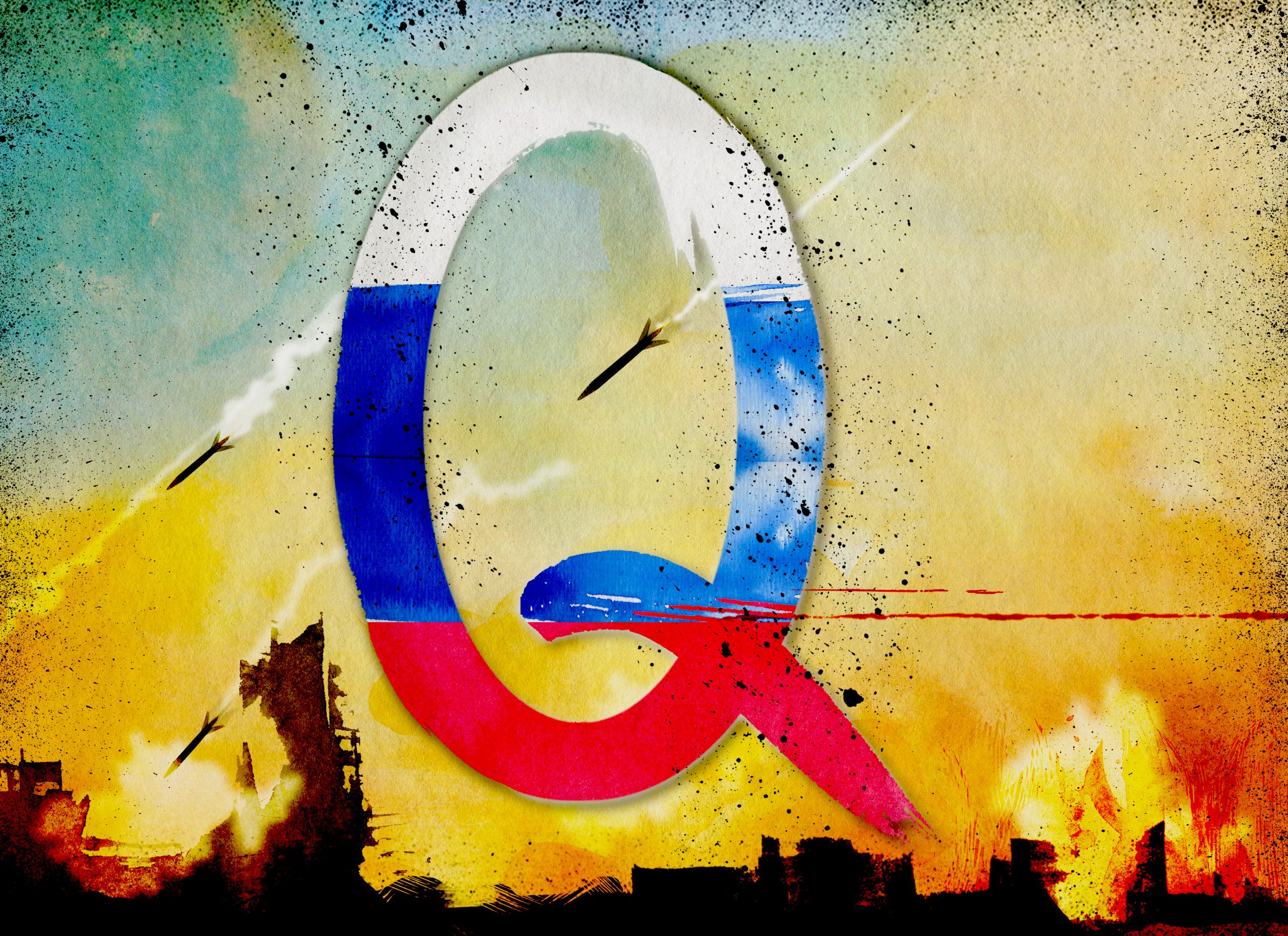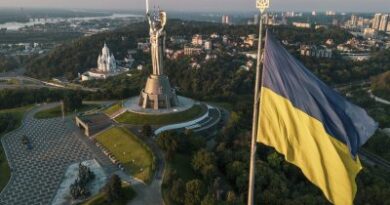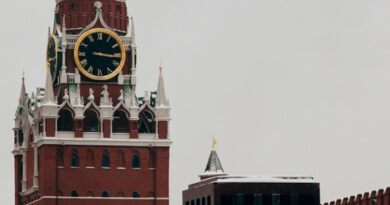Russia’s QAnon Followers Can’t Make Up Their Minds About Ukraine

Hours after Russia invaded Ukraine on 24 February 2022, what looked like a reassuring plea for peace was posted on a popular Russian Telegram channel.
“Dear God, save Russia and Ukraine,” the post read. “We are blessing each other. Please forgive us for our sins.” Below, a photo was added of two people with their arms around one another. One wore a Russia jacket while the other was resplendent in the colours and insignia of Ukraine . The accompanying caption reads “this is how it’s supposed to be!”
A Telegram post reads: “Dear God, save Russia and Ukraine. We are blessing each other, please forgive us all for our sins: This is how it’s supposed to be!”
Posts like these — unlike a lot of online content in Russia since the start of the war — were surprisingly frequent in one niche subset of Russian-language Telegram channels shortly after the onset of the conflict.
Incredibly, these posts came not from Russian opposition activists but from a subsection of Russian language QAnon channels on Telegram.
QAnon Russia, one of the most popular channels in this network with close to 90,000 followers, posted a call for “peace and love” a day after the invasion began. It also urged Russian soldiers not to bomb and shoot Ukrainians. A short time later, an emotional anti-war poem featured on the same channel.
Another channel urged their followers to fact check and practice good “mental hygiene” when consuming information they read online.
Many QAnon channels around the world have regularly praised Russia’s war since it began. They see the invasion as an effort to take down the international “Cabal” around which QAnon’s conspiracy theories are centred. They posit different ideas on the war’s goals, whether it’s to destroy US “biolabs” in Ukraine they claim are inventing a new Covid-like disease, or that it is about preventing the ‘Great Reset” which supposedly seeks to use the pandemic to destroy capitalism and install a one world government.
All of this supposedly makes Russia an ally in this fight and the invasion a war against all evil, for all good.
A Telegram post reads: “Vladimir Putin has upset this balance of the New world order… the balance as people like… Klaus Schwab… Bill Gates… want it” posts a UK channel
To be clear, some prominent Russian QAnon channels seen by Bellingcat do also appear to have been echoing the same themes as their global counterparts and continue to post seemingly in favour of the war, while others seem indifferent.
But others have been seen dismissing many of the most widely-held QAnon-related conspiracies related to the invasion itself, revealing a split in how the topic is viewed in the small but active Russian QAnon community.
Curiously, some of these accounts, including QAnon Russia, have gone quiet as the war has progressed.
Before doing so, however, those that appeared to have a more anti-war view took a step back, disavowing previously popular conspiracy theories that have been propagated about Ukraine in the global QAnon community as reason to support the war.
One expert told Bellingcat that the apparent divergence between Russian QAnon channels on the war in Ukraine is particularly interesting as they have seemed to be in lockstep on issues such as Covid-19 and vaccines in recent years.
What is QAnon?
QAnon is the conspiracy that falsely posits former US President Donald Trump has long worked to defeat a Satan-worshipping, paedophile “cabal” operating within the American “deep state.”
Despite Trump being voted out of office and the repeated failure of QAnon prophecies to come true, the conspiracy has continued to attract adherents. It has spread to numerous other countries beyond the US and pollinated a host of other harmful theories (such as those propagated by anti-vaxxers and the movement against 5G wireless technology).
While Q “drops” have ceased in the wake of Trump’s electoral defeat, Q’s followers remain active in this and a number of other evolving conspiracies around the world, including those that have developed around Ukraine.
Before February 24: Ukraine, Putin and QAnon
If Russian QAnon’s relationship towards the invasion of Ukraine comes as a surprise, that’s perhaps because believers in the conspiracy elsewhere tend to see Vladimir Putin as one of the few world leaders sticking it to the “global cabal”.
Ukraine, too, didn’t just become a topic of interest for global QAnon when Russia invaded the country in February 2022. This was thanks largely to a set of scandals and allegations tied to President Biden’s son Hunter, which range from questions of influence and lobbying regarding appointments to state-backed enterprises in Ukraine to wild conspiracy theories regarding biolabs and international child trafficking rings. QAnon channels the world over have fixated on the issue for years.
As early as November 2020, meanwhile, posts on international QAnon channels claimed Ukraine had long been captured by the so-called ‘deep state’. One Russian QAnon channel claimed that the Democratic Party, Barack Obama’s administration (in which Biden was Vice-President) and later Biden’s own Presidential administration, together with former Ukrainian President, Petro Poroshenko, stole more than one hundred billion dollars from Ukraine. On an Italian QAnon channel, it was claimed that the US not only overthrew then-President Viktor Yanukovych’s government in 2014, but followed that up with a plot to shoot down Malaysia Airlines Flight 17 (MH17) later that year to trigger a NATO invasion of eastern Ukraine. “The Bidens have farms in UA [Ukraine] next to the largest tunnel where kids, weapons and adrenochrome are smuggled”, claimed a Czech QAnon channel in December 2021 while making reference to a number of other QAnon conspiracies.
A December 2021 post from an Italian QAnon channel falsely claiming the United States deliberately shot down Malaysia Airlines Flight MH17 to trigger a NATO invasion of eastern Ukraine.
A number of other global QAnon conspiracy theories, well before Russia’s 2022 invasion, have also featured Ukraine front and centre. The ‘biolab’ conspiracy — pushed by Russian state sources in March 2022 which falsely claims American laboratories in Ukraine exist for the purposes of creating biological weapons — has circulated since at least 2021. Hinting at the ‘Great Reset’ theory, an Italian QAnon channel wondered in December 2021 whether Ukraine would finally “become part of Russia”. Black Lives Matter (BLM) protests in the US, meanwhile, were financed with “dirty money” from Ukraine, claimed a German QAnon channel in July 2020.
Most of global QAnon has long seen Putin as a hero, fighting by President Trump’s side. In January 2020, one of the first-ever posts on Russian QAnon was a claim that Putin had held a series of meetings in Damascus, Syria, that blocked the start of a third world war. A UK QAnon channel claimed in September 2021 that Putin had been fighting the satanic deep state cabal since he came into power, which is why the global media has made Russia and its President out to be the “bad guys”.
Putin’s apparent fight against “paedophilia” is another common theme across many global QAnon channels. For example, a Dutch QAnon channel posted in September 2021 that the Netherlands is a “pedoland” [using US spelling] and Putin is aware of it, sharing a video of Putin saying that there is a party in the Netherlands that supports paedophilia. This video, published on Youtube in 2014 with Dutch subtitles, has more than 100,000 views to date.
‘Putin is fighting for the freedom of human race’
Russia’s invasion of Ukraine in February 2022, for many European-based QAnon channels, pulled together all the loose Ukraine-related threads of their conspiracy theories into a tightly connected new reality. Bellingcat found previously well-worn conspiracy theories about Ukraine being a money laundering machine for the ‘deep state’ and ‘New World Order’ circulating in German, American, Italian, UK and Czech QAnon channels as soon as the invasion began.
A February 24, 2022 post from a German QAnon channel calling Ukraine a “money laundering machine” for the ‘deep state’.
Alongside these sorts of claims, the invasion of Ukraine served as evidence to support the conspiracy theory about Putin teaming up with Trump in the fight against the ‘deep state’ and coming back stronger than ever, as has been mentioned in UK and Italian QAnon channels. “This is all part of the plan” said another UK QAnon channel.
On the first day of the invasion, one German QAnon channel created a poll asking followers: “Who do you think Putin declared war on?” Ninety-per-cent of the more than 5,000 respondents agreed that “the cabal that took over Ukraine in a coup in 2014” was who Putin declared war on.
“Who do you think Putin declared war on?,” asks a poll on a German QAnon channel. 90% of respondents agreed that Putin declared war on “The cabal that took over Ukraine in a coup in 2014” (9 per cent said “I honestly don’t know” and only 1 per cent said Putin declared war on “the Ukrainian population”).
Putin’s apparent fight against the cabal and the deep state quickly became a common theme across a number of EU and other QAnon channels. The Russians are destroying the “CABAL” from Ukraine — whose banks and their servers are, apparently, located in Ukraine — posted a Dutch QAnon channel the day the invasion began. Another channel from Italy praised Putin for fighting “against the deep state” soon after. Later in March, a Czech QAnon channel, echoing Kremlin language not of war but of a “military operation,” praised Russia’s invasion as part of an attack “against the international network of pedophiles of the global elite”, hundreds of whom they claimed had been arrested “without the media attention of most state and corporate media.”
Further unfounded conspiracies seen by Bellingcat in prominent QAnon channels included theories that the Chernobyl nuclear plant was being used for everything “from dna experiments, adrenochrome, torture, childsex and rape facilities, cloning installations and much more.”
Similarly, an Italian QAnon channel claimed that Putin and Trump were actually destroying deep state headquarters, both above and below ground at Chernobyl.
An Italian QAnon channel, in a February 2022 post, claiming that Putin and Trump were actually destroying deep state headquarters, both above and below ground at Chernobyl.
Russian QAnon: “Dear God, save Russia and Ukraine…forgive us our sins”
The anti-war attitude seen on some Russian QAnon channels also comes as a surprise given past trends towards domestic politics in many of these groups themselves, where they have taken a pro-Kremlin stance.
In 2020, protests around the arrest of opposition politician Alexey Navalny were widely viewed negatively in Russian QAnon channels. Some described what was happening as “provocations” that were similar in nature to protests in Ukraine between 2013 and 2014 that saw then President, Viktor Yanukovych, booted out of office. Protests after the 2020 Presidential elections in Belarus were viewed similarly negatively, with Russian QAnon channels warning of a “Maidan scenario” in reference to the protests that saw Yanukovych deposed.
Yet as the 2022 conflict began, some Russian QAnon channels — particularly one of the largest and most popular channels, ‘QAnon Russia’ — made it clear they weren’t on their president’s side.
A day after the invasion began, QAnon Russia urged Russian soldiers not to bomb and shoot Ukrainians. “We are all going through a test now,” the channel posted to its 90,000 followers. “How we pass this test is up to us. War or peace? Hate or love?….the soldier is ordered to bomb and shoot. But who makes the decision? A human…peace and love to all who are in the war zone.”
Other QAnon Russia posts share similar anti-war messages, as well as missives promoting friendship and peace between Russians and Ukrainians. These included a poem from an astrologist criticising the war — which included the line “it’s time for us to become human/and not a tool of outrage”.
A video promoting an individual in the Russian city of Saint Petersburg holding up a sign reading “Hug me, I’m from Ukraine” was also shared. The channel even shared old posters from the Soviet era preaching messages of friendship among nations.
It is also noticeable that QAnon Russia, unlike many of its international peers, did not post about long-standing QAnon conspiracy theories after the invasion began. For this channel, the war isn’t a step towards the “Great Reset” as it appears to be for others both inside and outside Russia. “We shouldn’t follow enmity and hatred towards each other but kindness, love, brotherhood, mutual assistance, conscience,” a post on the channel read on February 25.
While the conspiracy theory about American biolabs in Ukraine has been mentioned in Russian QAnon channels going back to at least 2021, the topic has largely been dropped since the start of the invasion. Other conspiracy theories that had previously been mentioned, like the US wanting to start a war to avoid bankruptcy, have been similarly absent since the war commenced.
Even some smaller Russian QAnon channels that have shared conspiracy theories about biolabs, Biden and the like don’t strike the drumbeat of war. The Great Awakening channel, which has 5,000 followers peppered these claims with posts about programs and links Ukrainians can access for food, shelter, psychological help and to find missing relatives.
“Let’s unite, brothers: Russians, Ukrainians, Belarusians.” The figure holding the flag, with the distinctive haircut and beard, is recognisable as a depiction of a Ukrainian Cossack warrior”.
Some Russian QAnon channels have also had a surprising take on the country’s state media outlets. While QAnon adherents in western countries frequently share content from Russian sources like RT and Sputnik, some Russian QAnon channels have urged subscribers to be careful about the media they consume since the start of the war. “The official nature of the source is not at all a guarantee of its veracity”, wrote QAnon Russia on March 2. Another Russian language QAnon channel known as Awakening World even used a video from US-funded Radio Free Europe/Radio Liberty (RFE/RL) on civilian casualties in Ukraine to counter Putin’s claim that Russian forces were only attacking military targets.
Ironically, the aforementioned QAnon Russia channel has even pivoted to urge readers to resist disinformation, asking users “not to rush to conclusions without checking the information properly several times”. The channel’s advice includes engaging in self education, learning how to logically analyse information, and how to resist psychological and informational manipulations.
A QAnon symbol in the colours of the Russian flag (credit: Ann Kiernan).
In the last several weeks, however, QAnon Russia has fallen silent. The channel’s last post was on March 15, where it urged followers not to be discouraged, to “be a beacon for lost souls in this time of great changes”.
That could be because overt criticism has become costly in recent weeks. In Russia today, social media users who oppose what the government calls its ‘special military operation’ in Ukraine have been threatened and even prosecuted by the authorities.
However, other QAnon channels that have been either pro-war, anti-war or ambivalent to the invasion have continued to operate.
The division to date between some prominent Russian QAnon channels, their compatriots and global counterparts over the invasion of Ukraine has surprised some observers.
“Over the past two years in particular, there has been broad convergence among Russian and global Q communities on their response to COVID,” said Ciaran O’Connor, a disinformation and extremism researcher with the Institute for Strategic Dialogue, a London-based think tank that researches disinformation, hate and extremism online.
But Russia’s invasion of Ukraine was something QAnon communities, especially in Russia, didn’t expect to happen, O’Connor told Bellingcat. For example, QAnon Russia stated on February 16, just over a week before the invasion started, that there “definitely won’t be a war.”
The divergent reaction from many Russian QAnon communities — and indeed between different Russian QAnon channels themselves — reflects “a sign of conflict and contradictions with these communities over how to respond,” said O’Connor. “They struggle to find a position regarding Ukraine that sits well with their conspiratorial worldview.”
As the weeks and months of Russia’s brutal invasion drag on, even one of the pro-war Russian QAnon channels has begun to show signs of struggle, criticising their QAnon brethren — and even Putin himself. “Putin is not a hero who decided to destroy the dollar and the West,” Russia’s most popular, and the generally pro-war, Big Shock Theory channel told its more than 100,000 subscribers on April 9.
“When you hear someone say things like ‘Russia’s fighting the Great Reset’ or ‘Russia’s defeating the Globalists,’ it’s a clear sign they don’t understand what the Great Reset even is,” the channel wrote the next day. “Are we supposed to believe Putin doesn’t know COVID-19 vaccines are deadly?…And why is Putin still promoting vaccines and booster shots?”
“Claiming that Putin…has lost his temper and is looking to stop the Great Reset is like saying an actor in a play is about to go off script,” the channel’s post continued, “or that a game show contestant is about to bring down the host.
“It doesn’t make any sense,” it concluded.
Michael Colborne contributed to this report.
Bellingcat is a non-profit and the ability to carry out our work is dependent on the kind support of individual donors. If you would like to support our work, you can do so here. You can also subscribe to our Patreon channel here. Subscribe to our Newsletter and follow us on Twitter here.
This article has been archived for your research. The original version from bellingcat can be found here.


